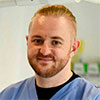Course overview
Health facilities at Teesside University
Check out Teesside University’s facilities for the School of Health and Life Sciences.
Over the 3-year course, you work within the entire perioperative environment across a variety of surgical specialities. You assist anaesthetists and surgeons alongside the wider multidisciplinary team and gain experience in various NHS and private hospitals.
This patient-centred course equips you with the knowledge, skills and understanding to contribute to healthcare delivery in a dynamic and fast-moving surgical environment. Graduates of the course will be eligible to apply for registration with the Health and Care Professions Council.
Gain practice and experience across a variety of perioperative areas including general surgery, orthopaedic surgery, ear, nose and throat, obstetric surgery, anaesthetic and post-anaesthetic care. Over 50% of the course is spent in hospitals on a rotation basis throughout the North East, alongside experienced clinical staff and previous Teesside ODPs. You follow various shift patterns including nights and weekends to gain the maximum learning experience. You are supported by evidence-based learning in lectures, seminars and practical activities in our clinical skills labs and simulated operating theatre. Your learning is underpinned and enhanced by the academic team who have decades of collective experience in theatre settings.
Top reasons to study this course:
- Financial support: study this course in September 2024 and automatically receive a £3,000 bursary. Find out more. You may also be eligible for a £5,000 maintenance grant each year from the NHS Business Service Authority. Find out more. You can apply for our Placement Support Fund if you are experiencing financial difficulties attending your placement. Find out more.
- Graduate success: 100% of BSc (Hons) Operating Department Practice Studies graduates go on to work and/or study 15 months after the course (Graduate Outcomes survey 2020-21, tees.ac.uk/source).
- Student satisfaction: 91% of BSc (Hons) Operating Department Practice Studies students agreed that the course has developed the knowledge and skills they think they will need for their future (National Student Survey 2023, tees.ac.uk/source).
- Placement opportunities: gain valuable learning experiences and specialised training in hospital theatres across the North-East.
- Industry-standard facilities: our bespoke simulation suite gives you realistic training experience.
Supporting information for applicants
Our School feedback policy (word - 278kb)
Our School reference policy (word - 276kb)
Course details
In the early part of the course you gain the relevant foundational knowledge and skills needed to work within the perioperative environment. You will gain an understanding of perioperative pharmacology, relevant anatomy and physiology, infection control and the legal and ethical concepts surrounding theatre care. Throughout the course, there will be a strong emphasis on evidence-based practice, clinical decision making and continuing professional development.
Course structure
Year 1 core modules
An Introduction to Evidence-based Practice for Health Professionals
You examine the role of evidence-based practice and sources of evidence: primary and secondary research, guidelines, audits and evaluations to support clinical decision making. You develop skills in formulating focused questions, developing effective search strategies and literature retrieval.
Foundations of Perioperative Care
You are introduced to the foundation knowledge for perioperative practice with an emphasis on reducing the risks of infection in the operating department. Using an evidence-based approach and making reference to local and national guidelines and policies, this module introduces the principles of safe perioperative practice. Where appropriate, selected content from human biology, physics and chemistry is included. Within the context of infection prevention, you recognise your professional responsibilities and apply given tools and techniques to justify your practice. This equips you with the basic knowledge and understanding of key principles required to enter the practice environment.
Introduction to Human Physiology for Healthcare Professionals
This multidisciplinary module introduces basic processes principles and concepts of human physiology required by a range of health professionals, including healing and repair processes.
Perioperative Practice Year 1 for ODP
This module develops your knowledge and skills to actively participate in patient care associated with theatre interventions linked to portfolio competencies. You’re placed in a variety of theatre placements to work towards developing competency in the three areas of operating department practice – anaesthesia, surgery and recovery.
Professionalism for Health Professionals
You develop an understanding of your role in the delivery of contemporary health and social care within the context of interprofessional practice and behaviour, preparing you for the demands of practice and ensuring you are sufficiently informed and equipped to practice safely. The module will also introduce you to the concepts of continuous professional development and lifelong learning and the tools to demonstrate this through the use of the e-portfolio. This will prepare you to produce evidence of professional development to maintain your professional registration with the Health and Care Professionals Council or General Dental Council.
Year 2 core modules
Clinical Decision Making in the Perioperative Environment
This module develops your ability to apply, relate and critically analyse evidence-based knowledge that underpins current perioperative practice. The main focus is on clinical decision-making and the effective use of the assessment process to ensure individualised care and applying safe practice within the perioperative environment.
You develop the knowledge and skills to promote independent learning whilst exploring the wider legal, ethical and governance issues that contribute towards the advancement of contemporary perioperative practice. You choose a specific aspect of perioperative care to use as the basis to demonstrate the effective application of theory to practice.
Dissertation Planning for Health Professionals
You further develop your knowledge of research methods and critical appraisal. The module will build upon the knowledge of the different research methodologies gained at level 4 and allow you to apply that knowledge to design a project using primary or secondary research methods.
You develop your operating department practitioner understanding of pharmacology, specifically drug groups used for patients undergoing operative procedures. You do this through a combination of lectures, workshops and seminars delivered over seven days and followed by a summative unseen exam. The module develops your knowledge of the methods of storing, handling, preparing and administering of drugs in the operating department environment.
Perioperative Practice Year 2 for ODP
Following on from Perioperative Practice Year 1 for ODP, this module further develops your knowledge and skills to actively participate in the patient care associated with theatre interventions linked to a portfolio of competencies.
You are placed in a variety of theatre placements to develop competency in the three areas of operating department practice - anaesthesia, surgery and post anaesthetic.
Final-year core modules
Perioperative Practice Year 3 for ODP
This module develops your knowledge and skills to actively participate in leading patient care and develops your understanding of advanced theatre care, associated with theatre interventions linked to a portfolio of competencies. Specific aspects of leadership and management are highlighted, including developing decision-making processes in relation to prioritising, co-ordinating and implementing care. Aspects of advanced theatre care include catheterisation, draping responsibilities and advanced theatre roles.
Through a series of lectures, skills workshops and enquiry-based learning you develop your self-directed learning and teamwork skills to promote personal and team effectiveness.
Professional Development for Operating Department Practitioners
The Health and Care Professions Council standards require that registrants maintain a continuous, up-to-date and accurate record of continuing professional development. This module enables you to identify and apply strategies that promote and encourage the concept of lifelong learning and prepares you for effective engagement with continuing professional development. You explore the drivers, legal, ethical and professional requirements of professional development and how it contributes to the provision of high quality care. You explore frameworks used to identify your own professional and developmental needs and engage in strategies to demonstrate how you can effectively engage with professional development.
Service Improvement for Operating Department Practice
Modules offered may vary.
How you learn
You will engage in key lectures, seminars and workshops. Practical workshops will be a key feature within the simulated theatre suite where you will practice in a realistic safe environment using SimMan technology to enhance your learning.
How you are assessed
Each module is assessed separately, using a variety of methods including examination, practice portfolio, poster presentation and written assignments
Our Disability Services team provide an inclusive and empowering learning environment and have specialist staff to support disabled students access any additional tailored resources needed. If you have a specific learning difficulty, mental health condition, autism, sensory impairment, chronic health condition or any other disability please contact a Disability Services as early as possible.
Find out more about our disability services
Find out more about financial support
Find out more about our course related costs
Entry requirements
Entry requirements
Call us on 01642 738400 about our entry requirements
For general information please see our overview of entry requirements
International applicants can find out what qualifications they need by visiting Your Country
You can gain considerable knowledge from work, volunteering and life. Under recognition of prior learning (RPL) you may be awarded credit for this which can be credited towards the course you want to study.
Find out more about RPL
Employability
Career opportunities
A qualified ODP is trained in all areas of theatre work and can specialise in surgery, anaesthetics or post-anaesthetic care. New areas of practice are also opening up to the ODP such as accident and emergency, intensive care units and specialist theatres. Career opportunities exist within NHS hospital trusts and private hospitals, primary care trust clinics and the armed forces.
You can progress to postgraduate study to develop to an advanced role and surgical care practitioner skills alongside surgeons. You can also develop your role through teaching, or pursue theatre management roles.
Information for international applicants
Qualifications
International applicants - find out what qualifications you need by selecting your country below.
Select your country:
Useful information
Visit our international pages for useful information for non-UK students and applicants.

 DipHE Operating Department Practice*
DipHE Operating Department Practice* BSc (Hons) Operating Department Practice Studies
BSc (Hons) Operating Department Practice Studies BSc (Hons) Operating Department Practice Studies
BSc (Hons) Operating Department Practice Studies
